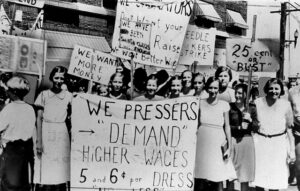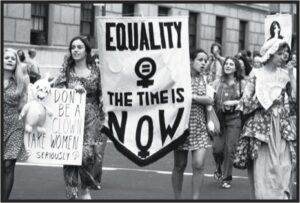- Work-Family Stressors, Gender, and Mental Health during COVID-19 and BeyondA briefing paper prepared by Daniel L. Carson, University of Utah, and Melissa A. Milkie, University of Toronto, for the Council on Contemporary Families symposium The COVID-19 Pandemic and the… Read more: Work-Family Stressors, Gender, and Mental Health during COVID-19 and Beyond
- The COVID-19 Pandemic and the Future of Gender Equality SymposiumA new CCF symposium highlights what emerging research tells us about changes to family & work life during the COVID-19 pandemic and what they mean for the future of gender equality in the U.S.
- Executive Summary: The COVID-19 Pandemic and the Future of Gender EqualityPrepared by Daniel L. Carlson, University of Utah, and Richard J. Petts, Ball State University, for the Council on Contemporary Families symposium The COVID-19 Pandemic and the Future of Gender… Read more: Executive Summary: The COVID-19 Pandemic and the Future of Gender Equality
- Childcare Challenges During the Pandemic and Their Impact on Parents and Care ProvidersA briefing paper prepared by Liana Christin Landivar, Women’s Bureau, U.S. Department of Labor, and Pilar Gonalons-Pons, University of Pennsylvania for the Council on Contemporary Families online symposium The COVID-19… Read more: Childcare Challenges During the Pandemic and Their Impact on Parents and Care Providers
- Pandemic Influences on Gender Inequality in Unpaid WorkA briefing paper prepared by Liana C. Sayer, University of Maryland and Joanna R. Pepin, University of Toronto for the Council on Contemporary Families online symposium The COVID-19 Pandemic and… Read more: Pandemic Influences on Gender Inequality in Unpaid Work
- Mothers Continue to Experience Career Consequences Three Years into the PandemicA briefing paper prepared by Jill E. Yavorsky, University of North Carolina Charlotte, Yue Qian, University of British Columbia, and Liana Christin Landivar, Women’s Bureau, U.S. Department of Labor, for… Read more: Mothers Continue to Experience Career Consequences Three Years into the Pandemic
- Can Remote Work Fuel Gender Equality? Evidence Shows Cause for Optimism but Challenges RemainA briefing paper prepared by Wen Fan, Boston University, and Richard J. Petts, Ball State University, for the Council on Contemporary Families symposium The COVID-19 Pandemic and the Future of… Read more: Can Remote Work Fuel Gender Equality? Evidence Shows Cause for Optimism but Challenges Remain
- Dads Home with Kids Peaked During The COVID-19 Pandemic – But Not for The Reason You ThinkA briefing paper prepared by Arielle Kuperberg, University of North Carolina – Greensboro, Sarah Thébaud, University of California, Santa Barbara, Kathleen Gerson, New York University, and Brad Harrington, Boston College,… Read more: Dads Home with Kids Peaked During The COVID-19 Pandemic – But Not for The Reason You Think
- Leave Laws Support EquityA briefing paper prepared by Jeff Hayes, Women’s Bureau, U.S. Department of Labor[1], and H. Elizabeth Peters, Urban Institute, for the Council on Contemporary Families symposium The COVID-19 Pandemic and… Read more: Leave Laws Support Equity
- Best for Whom? Breastfeeding and Child DevelopmentIn a new brief report from CCF, Jessica Su finds that breastfeeding benefits are modest, and reach some children more than others
- Between A Rock and A Hard Place: Lessons From The Covid-19 Pandemic About Health Concerns And US Mothers’ EmploymentNew research on how mothers’ concerns about community COVID-19 transmission affects their labor force participation.
- Mine and Yours, or Ours: Are All Egalitarian Relationships Equal?It turns out there is a big difference between dividing up the tasks so that each partner does different ones versus sharing or alternating the same tasks, so that partners contribute equally to each.
- Mothers Are the Primary Earners in Growing Numbers of Families with ChildrenA new study estimates that about 70% of U.S. moms can expect to be primary financial providers before their children turn 18.
- Why Families Need More Financial Support during the COVID-19 PandemicDespite the important temporary relief provided to many families by the March 2020 CARES Act, millions of American families are experiencing financial hardship as we enter the new year.
- Before and during COVID-19: Telecommuting, Work-Family Conflict, and Gender EqualityBefore and During COVID-19: Telecommuting, Work-Family Conflict, and Gender Equality A briefing paper prepared by Thomas Lyttelton (Yale Sociology), Emma Zang (Yale Sociology), and Kelly Musick (Cornell Policy Analysis and… Read more: Before and during COVID-19: Telecommuting, Work-Family Conflict, and Gender Equality
- CCF’S Stephanie Coontz Interviewed by Legacy Washington“Legacy Washington recently recorded an interview with author/historian Stephanie Coontz. Watch Legacy Washington historian Bob Young interview Coontz, an expert on family and marriage whose writing influenced the U.S. Supreme… Read more: CCF’S Stephanie Coontz Interviewed by Legacy Washington
- CCF’s Executive Director Jennifer Glass on the Struggle for Child Care in a PandemicParents often rely on their networks for child care, but how has that changed since COVID-19? CCF’s Executive Director Jennifer Glass has some thoughts in The Christian Science Monitor’s “‘I… Read more: CCF’s Executive Director Jennifer Glass on the Struggle for Child Care in a Pandemic
- CCF Experts Featured in The Washington Post, Boston Globe, Deseret NewsCCF experts Dan Carlson, Richard Petts, and Joanna Pepin discuss the findings of their latest brief report on gendered division of labor during the covid-19 pandemic with Deseret News’ Lois M.… Read more: CCF Experts Featured in The Washington Post, Boston Globe, Deseret News
- Men and Women Agree: During the COVID-19 Pandemic Men Are Doing More at HomeA briefing paper prepared by Daniel L. Carlson (University of Utah), Richard J. Petts (Ball State University), and Joanna R. Pepin (University of Buffalo – SUNY) for the Council on… Read more: Men and Women Agree: During the COVID-19 Pandemic Men Are Doing More at Home
- CCF’s Stephanie Coontz on Paying Stay-at-Home Parents in The New York TimesIn a recent article for the New York Times, CCF Director of Research and Public Education Stephanie Coontz discusses the potential implications of paying stay-at-home parents, a role most often… Read more: CCF’s Stephanie Coontz on Paying Stay-at-Home Parents in The New York Times
- Parents Can’t Go It Alone–They Never Have: What to Do for Parents to Help Our Next GenerationParents Can’t Go It Alone introduces you to important new work about what parents need to meet their goals and successfully raise the next generation.
- Why No One Can “Have It All” and What to Do About ItA briefing paper prepared by Kathleen Gerson, New York University, for the Council on Contemporary Families’ Symposium Parents Can’t Go It Alone—They Never Have. If debates about women’s rights, relationships… Read more: Why No One Can “Have It All” and What to Do About It
- Work that Works for Low-Wage WorkersA briefing paper prepared by Maureen Perry-Jenkins, the University of Massachusetts, Amherst, for the Council on Contemporary Families’ Symposium Parents Can’t Go It Alone—They Never Have. Low-wage jobs may not… Read more: Work that Works for Low-Wage Workers
- Hiring-related Discrimination: Sexist Beliefs and Expectations Hurt both Women’s and Men’s Career OptionsHiring-related Discrimination: Sexist Beliefs and Expectations Hurt both Women’s and Men’s Career Options A briefing paper prepared for the Council on Contemporary Families by Jill Yavorsky, Assistant Professor of Sociology… Read more: Hiring-related Discrimination: Sexist Beliefs and Expectations Hurt both Women’s and Men’s Career Options
- Three Q: Per Coontz, Equality Is an agenda for all working people, not just feminists.3q: Per Coontz, Equality is an Agenda for All Working People, Not Just Feminists Virginia Rutter interviews Stephanie Coontz on the new Council on Contemporary Families brief, Hiring-related Discrimination: Sexist… Read more: Three Q: Per Coontz, Equality Is an agenda for all working people, not just feminists.
- The Parenthood “Happiness Penalty”: The Effects of Social Policies in 22 CountriesA Brief Report Prepared for the University of Texas at Austin Population Research Center Jennifer Glass, Robin W. Simon and Matthew A. Andersson Introduction A large body of research… Read more: The Parenthood “Happiness Penalty”: The Effects of Social Policies in 22 Countries
- CCF BRIEF: On August 26, 2017, Women’s Equality Day Turns 44On August 26, 2017, Women’s Equality Day Turns 44. A fact sheet compiled for the Council on Contemporary Families by Nika Fate-Dixon and Stephanie Coontz, The Evergreen State College.… Read more: CCF BRIEF: On August 26, 2017, Women’s Equality Day Turns 44
- CCF ADVISORY: On August 26, 2017, Women’s Equality Day Turns 44ADVISORY: Women’s Equality Day Turns 44. Gains, stalls, and setbacks August 25, 2017, Austin, TX: Since 1973, August 26th has been designated as Women’s Equality Day, offering a chance… Read more: CCF ADVISORY: On August 26, 2017, Women’s Equality Day Turns 44
- Welfare Reform at 20. How’s that working for you?Welfare Reform at 20. How’s that working? Overview of the Welfare Reform at 20 Online Symposium prepared for Council on Contemporary Families by symposium editor Virginia Rutter, Professor of Sociology,… Read more: Welfare Reform at 20. How’s that working for you?
- Welfare Reform Attitudes and Single Mothers’ Employment after 20 YearsWelfare Reform Attitudes and Single Mothers’ Employment after 20 Years A briefing paper prepared for the Council on Contemporary Families by Philip Cohen, Professor of Sociology, University of Maryland. August… Read more: Welfare Reform Attitudes and Single Mothers’ Employment after 20 Years
- TANF didn’t fight poverty. Full employment did.A briefing paper prepared for Council on Contemporary Families by Alan Barber, Director of Domestic Policy, Center for Economic and Policy Research, and Virginia Rutter, Professor of Sociology, Framingham State… Read more: TANF didn’t fight poverty. Full employment did.
- Women Still at Work: CCF members weigh in on Anne-Marie Slaughter’s Unfinished Business: Women, Men, Work, FamilyCCF members Heather Boushey, Stephanie Coontz, and Nancy Folbre join other prominent feminists in reflecting on the significance of Anne-Marie Slaughter’s Unfinished Business: Women, Men, Work, Family for Short Takes: Provocations on Public Feminism,… Read more: Women Still at Work: CCF members weigh in on Anne-Marie Slaughter’s Unfinished Business: Women, Men, Work, Family
- Presidential Candidate Fact Checked by CCF Experts: Stephanie Coontz, Nancy Folbre, and Kristi WilliamsRH Fact Check cited CCF members Stephanie Coontz, Nancy Folbre, and Kristi Williams in its review of Jeb Bush’s comments on poverty and marriage, Hard Work and Marriage Aren’t the Magic… Read more: Presidential Candidate Fact Checked by CCF Experts: Stephanie Coontz, Nancy Folbre, and Kristi Williams
- What Helps Women Entrepreneurs Flourish?What Helps Women Entrepreneurs Flourish? A briefing paper prepared for the Council on Contemporary Families by Sarah Thébaud, University of California at Santa Barbara November 5, 2015 Most Americans agree… Read more: What Helps Women Entrepreneurs Flourish?
- Gender Revolution and the Restabilization of Family LifeGender Revolution and the Restabilization of Family Life A briefing paper prepared for the Council on Contemporary Families by Frances Goldscheider, College Park Professor of Family Science, University of… Read more: Gender Revolution and the Restabilization of Family Life
- The Continuing “Gender Revolution” in Housework and Care: Evidence from Long-term Time-use TrendsThe Continuing “Gender Revolution” in Housework and Care: Evidence from Long-term Time-use Trends A briefing paper prepared for the Council on Contemporary Families Online Symposium on Housework, Gender, and Parenthood… Read more: The Continuing “Gender Revolution” in Housework and Care: Evidence from Long-term Time-use Trends
- “Daddy’s Home!” Increasing Men’s Use of Paternity Leave“DADDY’S HOME!” INCREASING MEN’S USE OF PATERNITY LEAVE This briefing is based on a study by Dr. Ankita Patnaik. The original paper is available here and is forthcoming in the Journal of… Read more: “Daddy’s Home!” Increasing Men’s Use of Paternity Leave
- An Analysis of New Census Data on Family Structure, Education, and IncomeAn Analysis of New Census Data on Family Structure, Education, and Income A report and commentary prepared for the Council on Contemporary Families prepared for the Council on Contemporary Families… Read more: An Analysis of New Census Data on Family Structure, Education, and Income
- Brief: Back on Track? The Stall and Rebound in Support for Women’s New Roles in Work and Politics, 1977-2012Six charts demonstrate a renewed progress towards gender equality starting around 2006.
- Brief: Is the Glass Half Empty, or Three-Quarters Full?This look at sexual frequency among younger couples in equal marriages refutes recent claims that when a man share the housework equally, it is bad for the couple’s sex life.
- CCF Civil Rights Symposium: Women’s Changing Social Status since the Civil Rights ActToday the Council on Contemporary Families releases the third set of papers in a three part symposium marking the 50th anniversary of the Civil Rights Act. The first two sets of papers described changes in America’s religious and racial-ethnic landscape in the half century since it became illegal to discriminate on the basis of religion, skin color, national origin, race, ethnicity or gender.
- CCF Civil Rights Symposium: Dilemmas Facing High-Achieving Career WomenBy Joan C. Williams University of California, Hastings College of the Law Fifty years after discrimination on the basis of sex was outlawed, women have made tremendous progress moving into… Read more: CCF Civil Rights Symposium: Dilemmas Facing High-Achieving Career Women
- CCF Civil Rights Online Symposium, February 4-6, 2014On February 10, 1964, the House of Representatives passed the Civil Rights Act, which made it illegal to discriminate against individuals on the basis of race, national origin, religion, or gender, and sent the bill on to the Senate. On it’s 50th anniversary, CCF asked a dozen researchers to discuss what has changed in the past half century for each of the populations affected by the law – religious groups, racial and ethnic minorities, and women. On, February 4, the Council released an update on the changing religious landscape of America. On February 5, researchers described the rearrangements of racial and ethnic relations since 1964. And on Thursday, February 6, we reported on the progress of women since passage of the Civil Rights Act.
- Turns Out It’s Not How You Feel: It’s How You LookA new briefing report for the Council on Contemporary Families documents how the way you look affects your life prospects.
- Experts Respond to: “In School, Good Looks Help and Good Looks Hurt (But They Mostly Help)”Experts respond to a new briefing report for the Council on Contemporary Families that documents how the way you look affects your life prospects.
- In School, Good Looks Help and Good Looks Hurt (But They Mostly Help)How do your looks affect your life? Is being attractive or unattractive a source of systematic social inequalities in people’s access to wealth, power and privilege? Should we add “beauty bias” to racism and sexism as a type of unacceptable discrimination? A new briefing report for the Council on Contemporary Families documents how the way you look affects your life prospects.
- You’ve come a long way baby? Seeing men as more than sperm donorsRecent headlines such as “Men, Who Needs Them?” and “Why Fathers Really Matter” showcase a growing debate about the importance of including men in discussions of gender inequality. Two new studies from Gender & Society turn attention to areas in which men have long been ignored: at home, in the study of conception, pregnancy and childbirth, and at work, in the caregiving professions—particularly nursing. New research demonstrates under what conditions men’s contributions are slowly becoming more visible and what the benefits of that are (and can be).
- Family structure, race, education and economic inequalityCFF’s board members, Stephanie Coontz and Phil Cohen discuss the relationship between family structure, race, education and economic inequality in a Washington post article. Tweet
- CCF Equal Pay Symposium: 50 Years Since the Equal Pay Act of 1963Fifty years ago this week, on June 10, 1963, President John F. Kennedy signed the Equal Pay Act, amending the earlier Fair Labor Standards Act of 1938, to “prohibit discrimination on account of sex in the payment of wages by employers.” So, how’s that going?
- Gender Bias and the Fight for Equal PayBy Sheryl Sandberg Chief Operating Officer, Facebook and Founder, www.leanin.org For more information, or to arrange an interview, contact Andrea Saul: press@leanin.org In 1947, Anita Summers, the mother of my… Read more: Gender Bias and the Fight for Equal Pay
- Which Policies Promote Gender Pay Equality?By Joya Misra Professor of Sociology & Public Policy University of Massachusetts, Amherst misra@soc.umass.edu; 413-545-5969 Why do women earn less than men? Research points to a number of different explanations,… Read more: Which Policies Promote Gender Pay Equality?
- Gender Equality: Family Egalitarianism Follows Workplace OpportunityBy Philip N. Cohen University of Maryland Gender inequality within families is reciprocally related to gender inequality in the paid workplace. That is why one of the legacies of the Equal Pay… Read more: Gender Equality: Family Egalitarianism Follows Workplace Opportunity
- Happy Birthday Equal Pay: Pregnancy Accommodation as the New FrontierBy Joan C. Williams, Director of the Center for WorkLife Law, Hastings Foundation Chair, University of California, Hastings College of the Law williams@uchastings.edu; (415) 565-4706 Key pieces of legislation passed… Read more: Happy Birthday Equal Pay: Pregnancy Accommodation as the New Frontier
- The Wrong Route to Equality: Men’s Declining WagesBy Heidi Shierholz Labor Market Economist Economic Policy Institute, Washington, DC hshierholz@epi.org, (202) 775-8810 In the late 1970s, after a long period of holding fairly steady, the gap in wages… Read more: The Wrong Route to Equality: Men’s Declining Wages
- Men against Women, or the Top 20 Percent against the Bottom 80?By Leslie McCall Professor of Sociology and Political Science Faculty Fellow, Institute for Policy Research Northwestern University l-mccall@northwestern.edu It used to be that the most economically successful women earned no… Read more: Men against Women, or the Top 20 Percent against the Bottom 80?
- Equal Pay? Not Yet for MothersBy Shelley J. Correll Professor of Sociology Director Clayman Institute for Gender Research Stanford University scorrell@stanford.edu; 650-721-1736 Last month, hedge fund billionaire Paul Tudor Jones set off a controversy when he… Read more: Equal Pay? Not Yet for Mothers
- Trends in Global Gender EquityBy Stephanie Seguino Professor of Economics University of Vermont stephanie.seguino@uvm.edu; 802.656.0187 First the good news: Gender parity has already been reached in secondary educational enrollment rates in high-income countries and… Read more: Trends in Global Gender Equity
- From the Folks Who Brought you the Weekend: What Unions Do for WomenThe Equal Pay Act is often presumed to be an accomplishment of the feminist movement of the 1960s. In fact, it was spearheaded by female trade unionists, who first introduced the bill in 1945 as an amendment to the 1938 Fair Labor Standards Act. The bill was defeated, largely because of staunch opposition from business interests, but a coalition of labor activists reintroduced it every year until it finally passed in 1963.
- Leaning In Is Not the Same for Everyone: New Study on Women in “Men’s Jobs” Provides Discouraging Answers About the Impact of OverworkMEDIA CONTACT: Virginia Rutter Framingham State University Sociology Phone: 206 375 4139 Email: vrutter@gmail.com Back in the 1800s, the U.S. labor movement aimed at reducing impossibly long working hours—and succeeded with… Read more: Leaning In Is Not the Same for Everyone: New Study on Women in “Men’s Jobs” Provides Discouraging Answers About the Impact of Overwork
- Feminine Mystique Symposium: Feminism and Families TodayOn the 50th Anniversary of The Feminine Mystique, Council on Contemporary Families Scholars identify what’s changed—and what hasn’t.
- CCF Gender Revolution Symposium: What If Women Were In Charge?Philip N. Cohen, Ph.D. Department of Sociology University of Maryland, College Park Phone: 919 260 2868 Email: pnc@umd.edu Few would deny there was a gender revolution in the world of… Read more: CCF Gender Revolution Symposium: What If Women Were In Charge?
- CCF Gender Revolution Symposium: Gender Evolution among Employed MenBy Ellen Galinsky President Families and Work Institute Phone: 212.465.2044 Email: egalinsky@familiesandwork.org I prefer to think of changes in gender relations and values as an evolution, with ups and downs and… Read more: CCF Gender Revolution Symposium: Gender Evolution among Employed Men
- Let’s make a rule on sexual harassmentIn my mind — and in the law — there are two kinds of sexual harassment. The first kind is quid pro quo and easy to spot. A really detestable… Read more: Let’s make a rule on sexual harassment
- Council on Contemporary Families Releases New Research on Moms’ Depression; Study Includes a Win-Win Finding for Working Moms AND Stay-at-Home Moms But Findings Pose a Challenge to Employers and PoliticiansMothers of young children face difficult decisions when it comes to employment. Some feminists warn that staying home leads to social isolation, increasing the risk of maternal depression. But many neo-traditionalists counter that employment increases women’s stress levels, leading to depression because of lost time with children or worries about child care. The question of whether working or staying home causes depression matters not just for the sake of mothers’ happiness, but for the well-being of children, since maternal depression is a risk factor for children. So it is important to know the findings of a new study: When it comes to mothers’ risk of depression, both these one-size-fits-all arguments miss the mark.
- Working Mothers, Stay At Home Mothers, And Depression RiskMothers of young children face difficult decisions when it comes to employment. Some feminists warn that staying home leads to social isolation, increasing the risk of maternal depression. But many neo-traditionalists counter that employment increases women’s stress levels, leading to depression because of lost time with children or worries about child care. The question of whether working or staying home causes depression matters not just for the sake of mothers’ happiness, but for the well-being of children, since maternal depression is a risk factor for children. So it is important to know the findings of a new study: When it comes to mothers’ risk of depression, both these one-size-fits-all arguments miss the mark.
- International Report Card on Parenting Policies: U.S. Gets a “Gentleman’s C”By Rebecca Ray, Research Assistant Center for Economic and Policy Research Janet C. Gornick, Professor of Political Science and Sociology Graduate Center, the City University of New York John Schmitt,… Read more: International Report Card on Parenting Policies: U.S. Gets a “Gentleman’s C”
- Economic Woes = Family StressBy Valerie Adrian, Research Intern Council On Contemporary Families Stephanie Coontz, Co-Chair and Director of Research and Public Education Council on Contemporary Families Download Full Report as a PDF Download… Read more: Economic Woes = Family Stress
- Men’s Changing Contribution to Housework and ChildcareWe believe that the transformation of marriage that has occurred in the comparatively short period of 40 years is too great a break from the past to be dismissed as a slow and grudging evolution that has not fundamentally changed family dynamics. Our ongoing studies of couple relationships reveal instead that change has been continuous and significant, not merely in younger couples who begin their relationship with more flexible ideas about gender, but also in older couples where the wife has worked long enough to change her husband’s values and behaviors.
- It’s April 15: Do You Know Where Your Income Tax Dollars Are Going?Download Full Report as a PDF Download Full Report as a Word Document Americans tend to think we are better off than families in most other industrial countries because we… Read more: It’s April 15: Do You Know Where Your Income Tax Dollars Are Going?
- Women’s Money Matters: Earnings and Housework in Dual-Earners FamiliesDownload Full Report as a PDF Download Full Report as a Word Document What reduces women’s housework burden? A new study shows that on average it doesn’t have much to… Read more: Women’s Money Matters: Earnings and Housework in Dual-Earners Families
- Moms and Jobs: Trends in Mothers’ Employment and Which Mothers Stay HomeDownload Full Report as a PDF Download Full Report as a Word Document The employment of wives and mothers rose dramatically from 1960 to about 1990, and thereafter has leveled… Read more: Moms and Jobs: Trends in Mothers’ Employment and Which Mothers Stay Home
- A “Stalled” Revolution or a Still-Unfolding One?In 1960, only 40 percent of women aged 25-54 years old were in the labor force. By 2000, 70 percent of women that age were employed. For married women with children aged six through seventeen, employment rates grew from 40 percent in 1960 to a peak of almost 80 percent by the new millennium. Sixty percent of married women with children under school age now work for pay, compared to less than 20 percent in 1960. Mothers are still more likely than fathers to work part-time, but they are less likely to do so than they were in the past. Wives work for pay eighty percent of the hours their husbands work for pay, a huge increase since the 1960s.
- How Does the U.S. Rank in Work Policies for Individuals and Families?By Jody Heymann, Ph.D. Professor in the Faculties of Medicine and Arts McGill University Founder and Director of the Project on Global Working Families Alison Earle, Ph.D. Project Manager for… Read more: How Does the U.S. Rank in Work Policies for Individuals and Families?
- Are Mothers Really Leaving the Workplace?By Heather Boushey, Ph.D. Senior Economist Center for American Progress Download Full Report as a PDF Download Full Report as a Word Document Recent media reports claim that mothers are… Read more: Are Mothers Really Leaving the Workplace?
- Family Policy in the U.S., Japan, Germany, Italy, and France: Parental Leave, Child Benefits, Family Allowances, Child Care, Marriage, Cohabitation, And Divorce.Twentieth century social policy in industrial nations was originally formulated on the assumption that one particular family model was both the most prevalent and the most desirable. A family was supposed to consist of a married couple — one male breadwinner and one female homemaker — and their children, and the wages of a man were assumed to be enough to support a wife and children. Almost all women were assumed to be housewives. Accordingly, women and children’s access to market income was organized through marriage, as was their access to social insurance. Male workers could claim social insurance benefits for themselves and their dependents from the state, unions, employers and other institutions, but women seldom had any way to make claims independently. When husbands died, widows with children could draw pensions from the state and/or receive aid from the husband’s union, while women without husbands usually had no legal way to make such claims. At the same time, work was organized on the assumption that all men were married to women who could devote their time and labor to the care of children.
















































